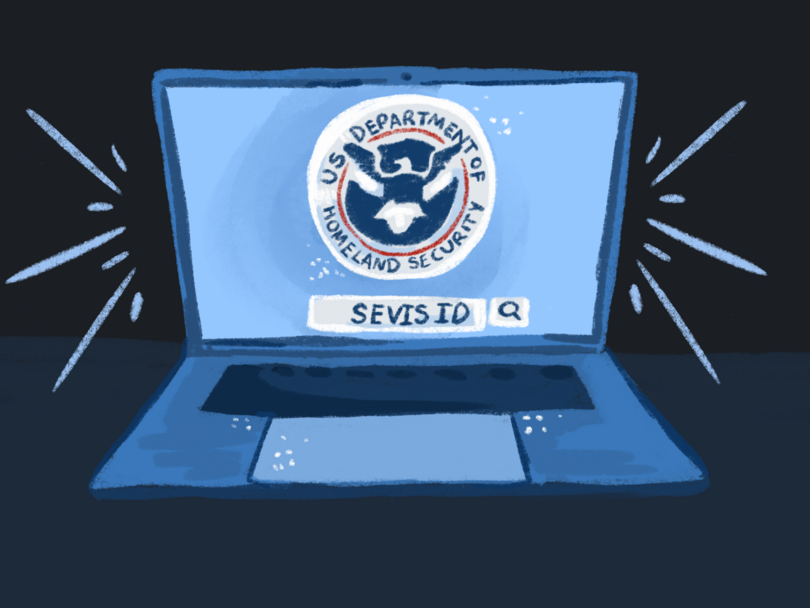Explaining the database Trump officials are using to track student visas

The Student and Exchange Visitor Information System is a federal digital database run by United States Immigration and Customs Enforcement. It monitors current information about nonimmigrant students and exchange visitors in the U.S. Hannah Mesa | Design Editor
Get the latest Syracuse news delivered right to your inbox.
Subscribe to our newsletter here.
As President Donald Trump continues to revoke international students’ visas, his administration uses the Student and Exchange Visitor Information System to terminate and reinstate student records. As of Friday, the government has begun restoring the records of international students through SEVIS.
SEVIS is a federal digital database managed by the U.S. Immigration and Customs Enforcement and working under the U.S. Department of Homeland Security, which allows international students to study in the United States. It tracks current information about nonimmigrant students and exchange visitors, collecting data on student admissions, enrollment and compliance of visa regulations.
The Trump administration revoked three Syracuse University international students’ visas, Tuesday. The students are among the over 1,800 international students and recent graduates who have had their visas revoked by the U.S. State Department, according to Inside Higher Ed.
The federal government began restoring SEVIS records of international students whose entries were terminated in recent weeks, but many of their visas remain revoked. The termination will still appear on their records even if reinstated, potentially affecting future applications for other immigrant status designations, including a green card.
The announcement marked a reversal of earlier decisions and came after international students nationwide filed around 100 federal lawsuits, Joseph Carilli, a government lawyer, said during a Friday court hearing.
Elizabeth Kurlan, an attorney for the Justice Department, said international students with terminated statuses will have their records “reactivated for the time being” as ICE works to create a new “framework” for termination policy, NBC reported. The reinstatements occurred with no evident explanation, multiple immigration attorneys said.
The system has tracked over 1 million international students since its creation in 2003, Inside Higher Ed reported. The federal government created SEVIS following the 9/11 attacks after it was revealed one of the attackers had entered the U.S. on a student visa.
When international students are accepted to Student and Exchange and Visitor Program-certified schools — a certification allowing higher education institutions to enroll international students, they receive either M-1 or F-1 nonimmigrant status in the U.S. An international student’s SEVIS status changes based on their length of stay. It starts as “initial” upon arrival and changes to “active” status as they continue their studies.
However, a student’s status may be terminated if they violate the terms of their visa, such as engaging in “unauthorized work” or failing to complete university-required coursework.
Typically, universities, not the federal government, make changes to a student’s SEVIS status. While the exact reasoning behind the recent students’ status terminations remains unclear, the SEVIS database records disciplinary actions taken by universities and criminal charges filed against students. In most cases, ICE cites minor disciplinary issues they discovered during background checks, NPR reported.
Attorneys and advocates said to NBC students who participated in pro-Palestine protests, those with prior arrests and those with politically-charged social media posts are more likely to face status termination.
Students whose status has been terminated can apply for reinstatement through the U.S. Citizenship and Immigration Services, another agency under the DHS. Without reinstatement, a terminated SEVIS status means students are no longer legally allowed to study or work in the U.S. and possibly forced to leave the country.
SU and other universities are helping affected international students continue their studies. Some institutions have advised students to leave the country or seek legal counsel.
The number of students affected continues to rise as higher education institutions learn about more new status terminations. It remains unclear whether all terminations will be reversed.





